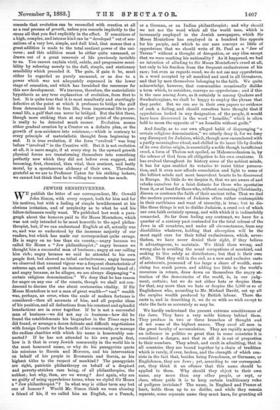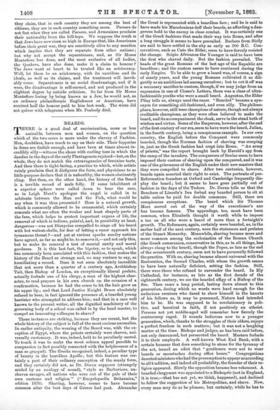JEWISH SENSITIVENESS.
WE publish the letter of our correspondent, Mr. Oswald John Simon, with every respect, both for him and for his motives, but with a feeling of simple bewilderment at his obvious irritation, and of perplexity as to what he and his fellow-tribesmen really want. We published last week a para- graph about the honours paid to Sir Moses Montefiore, which was not only intended to be most honorific to the aged philan- thropist, but, if we can understand English at all, actually was so, and was so understood by the immense majority of our readers, but which has made our correspondent quite savage. He is angry on no less than six counts,—angry because we called Sir Moses a " Jew philanthropist ;" angry because we thought him a successful man of business ; angry at our calling him rich ; angry because we said he attended to his own people first, but showed no tribal exclusiveness; angry because we observed that unusual vigour was a frequent characteristic of extreme age, and quoted an instance we had recently heard of ; and angry because, as he alleges, we are always disparaging " a certain religious denomination." We deny that he has reason for anger on any one of the counts, though we shall not con- descend to discuss the one about centenarian vitality. If Sir Moses Montefiore is not a man of great wealth—" vast" wealth was, perhaps, an error, when the scale of modern fortunes is considered—then all accounts of him, and all popular ideas of his position, and all deductions from his constant and splendid benefactions are in error together. If he is not a successful man of business—we did not say in business—how did he found the establishments his biographer in the Times says he did found, or arrange a dozen delicate and difficult negotiations with foreign Courts for the benefit of his community, or manage the endless charities with which his name is honourably con- nected P If he has not attended to his own people first, how is it that in every Jewish community in the world his is the most honoured name, or why do his panegyrists quote his missions to Russia and Morocco, and his intervention on behalf of his people in Roumania and Servia, as his highest titles to the respect of mankind P The panegyrists are right, patriotic philanthropy on behalf of a despised and poverty-stricken race being, of all philanthropies, the noblest; but why, then, are we wrong ? And again, why are we guilty of using opprobrious terms, when we styled Sir Moses a " Jew philanthropist " P In what way is either term any but one of honour P Would Mr. Simon think we were abusing a friend of his, if we called him an English, or a French,
or a German, or an Indian philanthropist; and why should we not use the word which all the world uses, which is incessantly employed in the Jewish newspapers, which Sir Moses Montefiore has employed in a hundred fine appeals for his people, and which to our ears conveys so little of opprobrium that we should write of St. Paul as a " Jew of Tarsus " without a thought of derogation, or any idea except that we were marking his nationality ? As it happened, we had no intention of alluding to Sir Moses Montefiore's creed at all, but only to his freedom from the frequent exclusiveness of his race; but even as regards creed, we do not see any opprobrium in a word accepted by all mankind and used in all literatures, and that by men themselves• belonging to the faith. We quite acknowledge, however, that communities occasionally dislike a term which, to outsiders, conveys no opprobrium ; and if this is the case among Jews, as it certainly is among Quakers and Swedenborgians, we shall be happy to employ the phrase that they prefer. But we can see in their own papers no evidence of such a feeling, and should ourselves have thought that if opprobrium lurked in any designation , of the people, it would have been discovered in the word " Israelite," which is often held to mean the opposite of " an Israelite without guile."
And finally, as to our own alleged habit of disparaging "a certain religious denomination," we utterly deny it, for we deny any disrespect for Judaism, which, though now encumbered with a partly meaningless ritual, and chilled in its inner life by doubts of its own divine origin, is essentially a noble though insufficient creed, a form of Theism not spoiled, as Mahommedanism is, by the release of God from all obligation to his own creatures. It has evolved throughout its history some of the noblest minds, it has for ages enabled its votaries to resist bitter persecu- tion, and it even now affords consolation and light to some of the loftiest minds and most benevolent hearts to be discovered in Europe. So little do we despise it, that we are aware of and rebuke ourselves for a faint distaste for those who apostatise from it, or at least for those who, without embracing Christianity, disown or contemn the faith of their ancient tribe. That we find the modern perversions of Judaism often rather contemptible in their earthiness and want of sincerity, is true; but to dis- like these things is not to dislike Judaism, a creed out of which our own faith certainly sprang, and with which it is indissolubly connected. So far from feeling any contempt, we have for a quarter of a century past contended for the total release of the Jews in all countries, and under all circumstances, from any disabilities whatever, holding that absorption will be the most rapid cure for their tribal exclusiveness, which, never- theless, we have never denied their right, if they believe it advantageous, to maintain. We think them wrong, and wrong also in avoiding the usual occupations of mankind, and seeking to live solely as distributors ; but that is their own affair. That they will in the end, as a new and exclusive caste of aristocrats, possessed of too large a share of wealth, exer- cising too much power, and adding too little to the world's resources in return, draw down on themselves the angry at- tention of the democracies of the world, is, in our judg- ment, certain ; but we do not either hate or despise them for that, any more than we hate or despise the 5,000 or so of Englishmen who, according to Mr. Michael Devitt, eat up all the surplus wealth produced by British labour. There the caste is, and in describing it, we do so with no wish except to state the facts as accurately as may be.
We hardly understand the present extreme sensitiveness of the Jews. They have a very noble history behind them. They produce in two or three branches of thought and of art some of the highest names. They excel all men in the great faculty of accumulation. They are rapidly acquiring an influence in politics so great that in some countries it is considered a danger, and that in all it is out of proportion to their numbers. They admit, and exult in admitting, that in all countries they are bound together by a chain of tradition which is rarely, if ever, broken, and the strength of which con- sists in the fact that, besides being Frenchmen, or Germans, or Englishmen, they are Jews ; yet, according to our correspond- ent, they think it an offence that this name should be applied to them. Why should they object to their own name, any more than any other people, or sept, or class, whose pride it is to keep certain traditionary rules of pedigree inviolate? The name, in England and France at least, holds them up to no dislike, and while they remain separate, some separate name they must have, for granting all they claim, that in each country they are among the best of citizens, they are in each country something more. Parsees do not fret when they are called Parsees, and Armenians proclaim their nationality from the hill-tops. We suppose the truth is that Jews have now risen so high in Europe that, like Americans before their great war, they are sensitively alive to any mention which implies that they are separate from other nations ; but why not accept the separateness, and, as Sir Moses Montefiore has done, and the most exclusive of all bodies, the Quakers, have also done, make it a claim to honour ? The Jews want at heart to be treated like an aristocracy. Well, let them be an aristocracy, with its sacrifices and its ideals, as well as its claims, and. the treatment will inevit- ably come. Separateness is no social disadvantage, and if it were, the disadvantage is sell-earned, and not produced in the slightest degree by outside criticism. So far from Sir Moses Montefiore losing by being known as a Jew, he would not, as an ordinary philanthropic Englishman or American, have received half the honour paid to him last week. The wires did not quiver with telegrams when Mr. Peabody died.







































 Previous page
Previous page